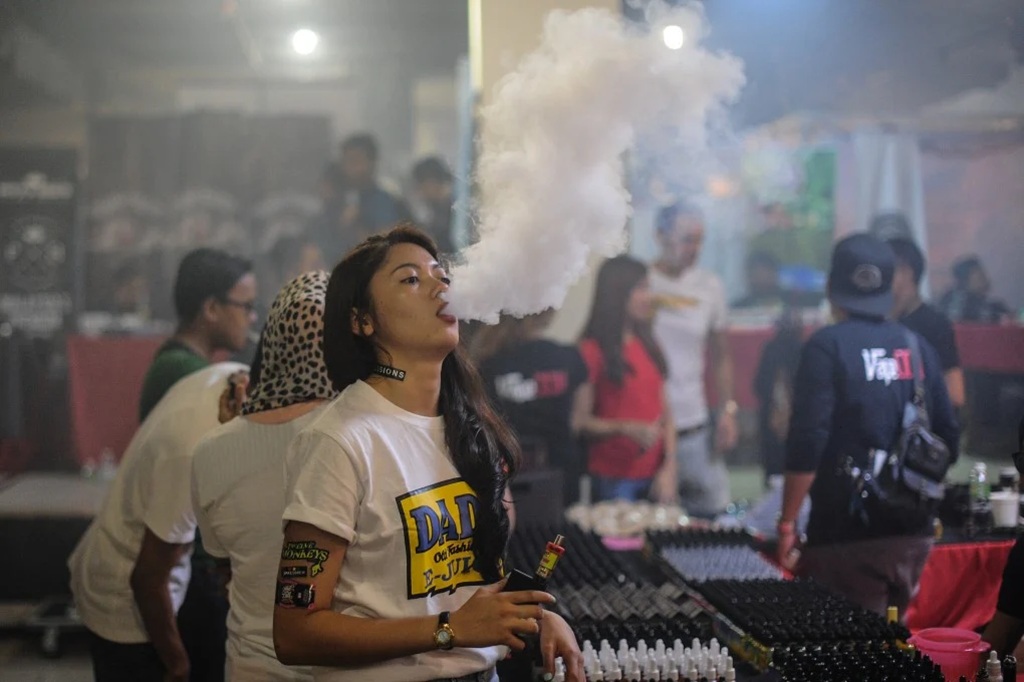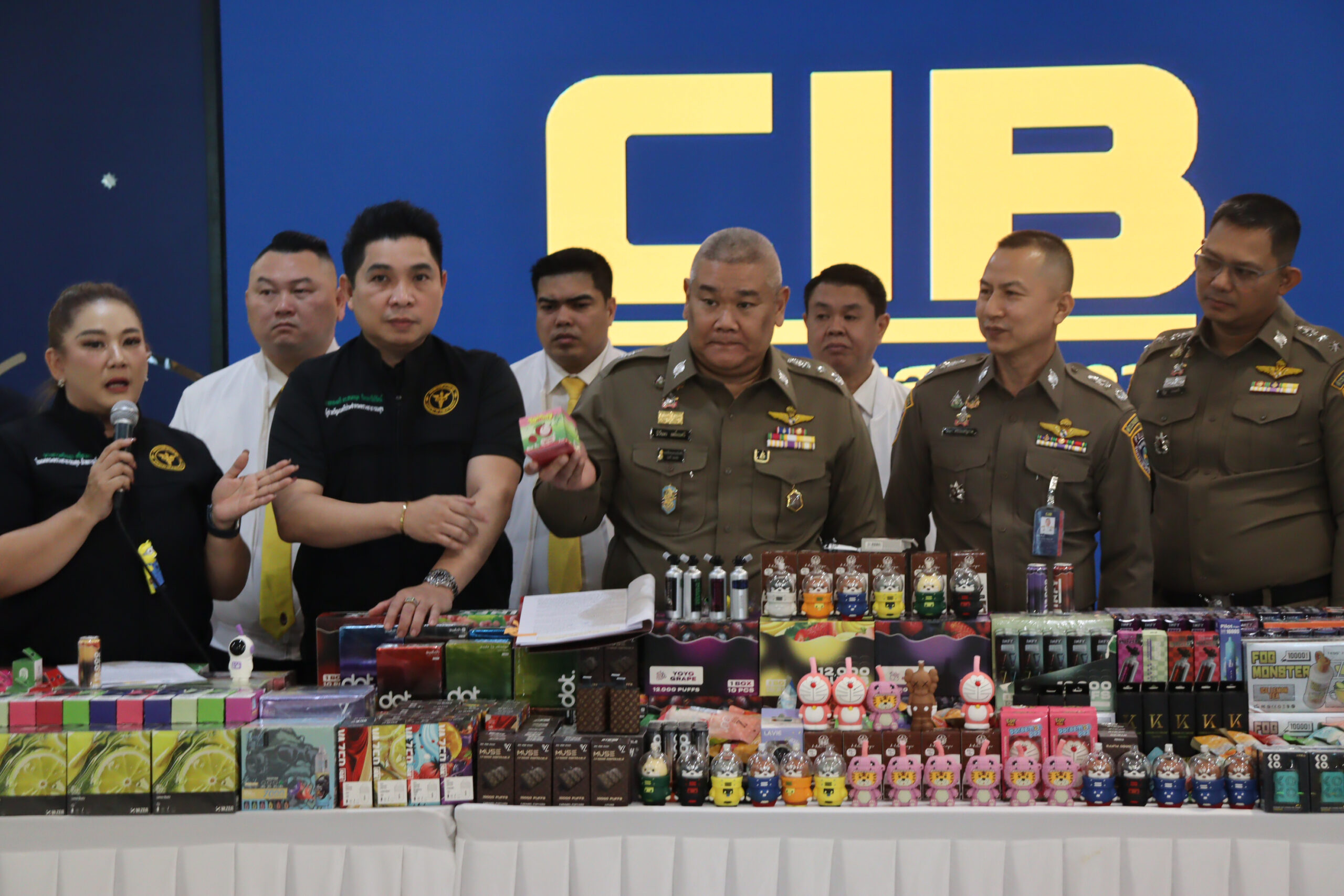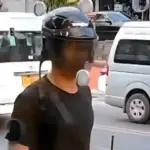BANGKOK — Thai officials have launched a major crackdown on a new drug threat targeting young people with “zombie vape pods.” These e-cigarettes contain phencyclidine (PCP), a strong hallucinogenic drug also used as a horse tranquiliser.
The term “Zombie Vape” comes from the way the drug leaves users dazed and confused, which has caused growing concern among health workers, police, and parents. With vaping already banned in Thailand, this new, more dangerous version has prompted fresh action to stop its spread and keep people safe.
Tests have found some pods contain not just PCP but also other harmful substances, including synthetic drugs and fentanyl, making them even riskier. The same concerns often apply to other forms of drug use, such as using a water bong, where users must be cautious about what substances are being inhaled.
Last week, police carried out a high-profile raid in Bangkok’s busy Klong Toei area, arresting eight people linked to the sale of zombie vape pods. They seized assets worth more than 16 million baht (about USD 470,000).
Officers uncovered a well-organised group selling these pods, which mix attractive e-cigarette flavours with the strong effects of PCP—a controlled drug known for causing dissociation and hallucinations.
PCP was first made in the 1950s as an anaesthetic, but was banned for people after its serious side effects became clear. It can cause paranoia, aggression, and psychosis. Today, it’s used in vet clinics to sedate big animals like horses.
When inhaled from zombie vape pods, PCP acts quickly and powerfully, sending users into a state where they can’t control their movements or thoughts. Officials say these pods, sometimes called “pod k,” are disguised as standard vapes, making them especially sneaky.
“This isn’t just about vaping—it’s a real health emergency,” said Dr Somsak Anantasomboon, a toxicologist at Ramathibodi Hospital. “PCP in vaping devices is a dangerous mix, especially for young people who may not know what they’re using.”

Zombie Vape Among Thai Youth
Even though vaping has been against the law in Thailand since 2014, it’s still popular with teenagers. Sleek designs, sweet flavours, and posts on social media have boosted its appeal. The country’s rules ban the sale, import, and use of vapes, with fines of up to 30,000 baht or up to three years in jail. Despite this, black-market sales continue, with products smuggled in from Malaysia and China.
For many young Thais, vaping seems cool and modern—a step away from old-fashioned cigarettes. Trendy, hidden vape shops in cities and online sellers make it easy for them to get these products. Surveys from the Ministry of Public Health in 2024 say more than 15% of people aged 15–24 have tried vaping, up from 5% just five years ago.
Zombie vape pods have made the problem more serious. Unlike normal vaping liquids, which usually contain nicotine, flavourings, and propylene glycol, these pods are mixed with PCP, a much more dangerous drug.
“The bright packaging and fruity smells draw kids in, but what they’re really getting is much riskier than they think,” said Police Colonel Thawatchai Srisuk, who led the recent raid. “Dealers are taking advantage of their curiosity.”
Breathing in PCP from vape pods can cause severe health problems. PCP affects the brain directly, causing confusion, odd behaviour, and trouble with movement. People might experience hallucinations, delusions, or even aggression.
High doses can lead to seizures, coma, or even death. Long-term use is linked to memory loss, depression, and symptoms similar to schizophrenia.
Vaping makes these risks worse. Instead of burning plant material like a cigarette, vaping heats liquid and creates a mist that goes deep into the lungs. This means PCP enters the body faster and can have a stronger effect.
Black-market products are also dangerous because there is no control over what’s inside. Tests have found some pods contain not just PCP but also other harmful substances, including synthetic drugs and fentanyl, making them even riskier.
Young people are especially vulnerable. The brain is still developing in teenagers, so PCP can harm memory, learning, and even lead to addiction problems later in life. Hospitals in Bangkok have seen more patients with vaping-related issues, including severe anxiety, confusion, and breathing problems.
The social impact is also concerning. Videos on TikTok and Instagram show teens using zombie vape pods, wandering in public or acting strangely, unaware of the risks. These scenes have caused public anger and calls for stricter control of vaping.

How Authorities Are Responding
The Thai government has moved quickly to tackle the problem. The Ministry of Public Health and the Royal Thai Police have pledged to destroy the illegal supply network. Recent raids in Bangkok, Chiang Mai, and Pattaya have led to the seizure of thousands of vape devices and large amounts of suspicious liquids.
Prime Minister Paetongtarn Shinawatra spoke about the issue on television on May 3, promising zero tolerance for illegal vaping. “We can’t let these drugs harm our children and our communities,” she said. The government has started a public campaign with posters and videos to warn people about the risks, asking parents to keep a close eye on their children.
But stopping the spread is tough. Thailand’s open borders and the global vape trade make it hard to block illegal products. Online sales, often done through private messaging apps, are difficult to track. The lure of quick money has even attracted organised crime groups, making enforcement harder.
Public health experts say education is just as important as law enforcement. “We need to teach young people about the dangers of vaping and drugs like PCP,” said Nattaya Boonpakdee, director of the Thai Health Promotion Foundation. “Punishing people won’t fix the problem. We have to reduce the desire for these products.”
Thailand now faces a dangerous mix of illegal vaping and strong drugs, as zombie vape pods continue to threaten young people and communities. The risk goes far beyond normal vaping, putting lives and futures in danger. Parents, teachers, and leaders all need to work together to stop this crisis.
Health workers urge anyone who thinks they have a zombie vape pod not to use it and to tell the authorities. Symptoms such as confusion, seeing things that aren’t there, or acting strangely need urgent medical help. The government is also testing new ways, including using AI, to track online vape sales.
While recent police action has made the streets a bit safer, the fight isn’t over. As long as these pods are profitable, sellers will keep trying to get them into the country and the hands of young people. The campaign to stop Thailand’s next drug crisis is only just starting.
If you or someone you know needs help with substance abuse, call the Ministry of Public Health helpline at 1669.














